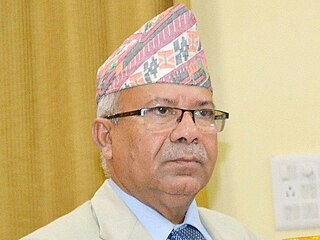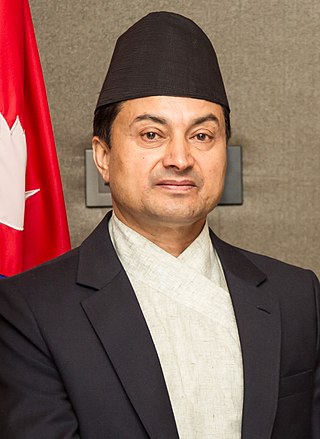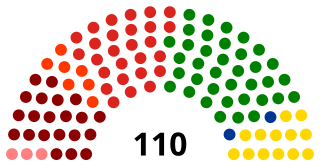Related Research Articles

The Communist Party of Nepal (Unified Marxist–Leninist) (Nepali: नेपाल कम्युनिष्ट पार्टी (एकीकृत मार्क्सवादी-लेनिनवादी), romanized: nēpāla kamyuniṣṭa pārṭī (ēkīkr̥ta mārksavādī-lēninavādī); abbr. CPN (UML)) is a communist political party in Nepal. The party emerged as one of the major parties in Nepal after the end of the Panchayat era.

Nepal Ratna Man Padavi Madan Kumar Bhandari, commonly known as Madan Bhandari, was a popular Nepali political leader belonging to the Communist Party of Nepal, a democratic communist party in Nepal. He defeated the incumbent Prime Minister Krishna Prasad Bhattarai in a landslide victory in the 1991 general election. Known for his charismatic style, Bhandari propounded the popular communist principle or thought "People's Multiparty Democracy". He is widely regarded for peaking the Nepal's communist movement to a greater height. He died in a jeep accident in Dasdhunga, Chitwan, in 1993.

The Communist Party of Nepal (Marxist–Leninist) is a communist political party in Nepal. It was formed by Chandra Prakash Mainali when the Communist Party of Nepal (Marxist–Leninist) reunified with Communist Party of Nepal. Mainali had refused to go along with the merger and led a faction of the former Communist Party of Nepal (Marxist–Leninist) to reorganize the party.

Madhav Kumar Nepal, is a Nepalese politician and former Prime Minister of Nepal. He served as Prime Minister of Nepal from 25 May 2009 to 6 February 2011 for nearly two years.
Chandra Prakash Mainali more commonly known as C. P. Mainali is a communist politician in Nepal and former Deputy Prime Minister of Nepal.

The Nepal Communist Party, abbreviated NCP is a defunct communist party which existed in Nepal from 2018 to 2021. It was founded on 17 May 2018, from the unification of two leftist parties, Communist Party of Nepal and Communist Party of Nepal. The unification was completed by the Party Unification Coordination Committee, after eight months of negotiation. The two predecessor parties subsequently dissolved, making way for the new united party. The party retained the electoral symbol of the CPN (UML), the sun.
Yam Lal Kandel is a Nepalese politician, belonging to the Communist Party of Nepal. He is the standing member of CPN-UML and parliamentary leader of CPN-UML in Karnali Province. In the 2008 Constituent Assembly election he was elected from the Surkhet-2 constituency, winning 16297 votes. He completed his postgraduation in Commerce from Tribhuvan University in 1990 and has been engaged in full-time politics since 1979. He was nominated as minister in 1998, parliamentarian in 1994 and mayor in 1992.

Jhala Nath Khanal is a Nepalese politician who was the 35th Prime Minister of Nepal from February 2011 to August 2011. He was previously the chairman of the Communist Party of Nepal and Leader of the Constituent Assembly Parliamentary Party of the CPN (UML).

Bam Dev Gautam is a Nepalese politician and the former Home Minister and Deputy Prime Minister of Nepal. A member of CPN, Gautam is a former Senior vice Chairman of Communist Party of Nepal. He is currently member of National Assembly nominated by President.

Keshav Prasad Badal is a Nepalese politician.
Surendra Pandey is a nepalese politician and current vice chairman of Communist Party of Nepal. He was a member of the 2nd Nepalese Constituent Assembly. He won the Chitwan–1 seat in 2013 Nepalese Constituent Assembly election from the Communist Party of Nepal.
Bhim Acharya secretary of Communist Party of Nepal, is the former Chief minister of Province No. 1. Governor Somnath Adhikari appointed Bhim Acharya as the chief minister as per Article 168 (1) of the Constitution of Nepal after He was unanimously elected parliamentary party leader of the CPN (UML) on 26 August 2021, following the resignation of outgoing chief minister Sher Dhan Rai as both the parliamentary party leader and chief minister. He assumed the post of the Minister for Culture, Tourism and Civil Aviation of Nepal on 25 February 2014 under Sushil Koirala-led government.

Gokarna Bista is a Nepalese politician and was Secretary of Communist Party of Nepal (UML). He served as Ministry of Energy under the prime minister Jhala Nath Khanal and is former Minister of Labour, Employment and Social Security under KP Oli led cabinet. He was elected in the 2013 Nepalese Constituent Assembly election from Gulmi district constituency number 3. In April 2011, during his tenure as Ministry of Energy, he was stabbed by two motorcyclists. He became popular for revolutionary changes in power sector of Nepal.

General elections were held in Nepal in two phases on 26 November and 7 December 2017 to elect the 275 members of the fifth House of Representatives, the lower house of the Federal Parliament of Nepal.

The Koshi Provincial Assembly also known as the Koshi Pradesh Sabha, is the unicameral legislature of Koshi Province, one of the seven provinces in Nepal. The assembly is seated at the provincial capital at Biratnagar in Morang District at the District Coordination Committee Office. The assembly has 93 members of whom 56 are elected through first-past-the-post voting and 37 are elected through proportional representation. The term of the assembly is 5 years unless dissolved earlier.

The Provincial Assembly of Bagmati Province also known as the Bagmati Pradesh Sabha, is a unicameral governing and law making body of Bagmati Province, one of the seven provinces in Nepal. The assembly is seated in the provincial capital at Hetauda in Makwanpur District at the Regional Educational Directorate Office. The assembly has 110 members of whom 66 are elected through first-past-the-post voting and 44 of whom are elected through proportional representation. The term of the assembly is five years unless dissolved earlier.

General elections were held in Nepal on 20 November 2022 to elect the 275 members of the House of Representatives. There were two ballots in the election; one to elect 165 members from single-member constituencies via FPTP, and the other to elect the remaining 110 members from a single nation-wide constituency via party-list proportional representation.

Prakash Jwala is a Nepali politician currently serving as minister of physical infrastructure and transport of Government of Nepal. He also served in the House of Representatives from 1999 until 2008 and in the Karnali Provincial Assembly from 2018 until his expulsion in April 2021, representing the Salyan 1 constituency as a member of the Communist Party of Nepal. After his expulsion, Jwala joined the newly-formed Communist Party of Nepal, and is running as one of its candidates for the House of Representatives in the 2022 Nepalese general election.
The first Province No. 1 Provincial Assembly was elected by the 2017 provincial elections. 93 members were elected to the assembly, 56 of whom were elected through direct elections and 37 of whom were elected through the party list proportional representation system. The term of the assembly started on 5 February 2018 and ended in September 2022. Sher Dhan Rai and Bhim Acharya served as chief ministers from CPN and Rajendra Kumar Rai served as chief minister from CPN during the term of the assembly. Pradeep Kumar Bhandari served as the speaker of the assembly and Saraswati Pokharel served as deputy speaker.
The first Bagmati Provincial Assembly was elected by the 2017 provincial elections in Nepal. 110 members were elected to the assembly, 66 of whom were elected through direct elections and 44 of whom were elected through the party list proportional representation system. The term of the assembly started on 1 February 2018 and ended in September 2022. Dormani Poudel and Astalaxmi Shakya served as the chief ministers from the CPN (UML) and Rajendra Prasad Pandey served as chief minister from CPN during the term of the assembly. Sanu Kumar Shrestha served as the speaker of the assembly and Radhika Tamang served as the deputy speaker.
References
- ↑ "निर्वाचन मतगणनाको परिणाम". result.election.gov.np. Retrieved 2021-01-30.
- ↑ Sureis (2018-02-14). "Province 3 chief minister inspects Muglin road". The Himalayan Times. Retrieved 2021-01-30.